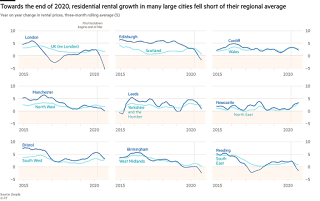Residential Rents Plummet in Major UK Cities
https://www.ft.com/content/2d81120b-da42-4e3e-a165-8fc20f415cbd
Rents are falling fast in major cities across the UK as a result of coronavirus, which has caused demand for properties from overseas workers, students, tourists and corporate travellers to plummet. The falls are most pronounced in London, the city in the UK most exposed to the demand shock unleashed by the pandemic. But rents in Manchester, Birmingham, Edinburgh, Leeds and Reading have also tumbled in recent months, and are unlikely to rebound quickly, according to data from property portal Zoopla. In the 12 months to October, average rents in London fell 6.9 per cent; in Birmingham they slipped 3.2 per cent; in Reading 2.2 per cent and in Edinburgh 1.7 per cent. All cities in the analysis fell below their surrounding region, reflecting weak demand for accommodation closer to town centres.
Rents had continued to grow in Leeds and Manchester through much of the pandemic, but both dipped into negative territory in the year to October.
That marks a dramatic reversal: in the year to March, when the first national coronavirus lockdown was introduced, rents in Leeds increased by more than 4 per cent; in Edinburgh average rents were up 2.5 per cent.
The sharp falls come against a background of rapid and profound change in the most affected cities, with the pandemic shifting demographics, working patterns and the financial status of many residents. With foreign travel banned or limited for much of the past 12 months, foreign students, workers and tourists have been unable to come to the UK.
The increased prevalence of homeworking has frayed bonds to the office, and allowed renters to relocate further afield. Rather than living in expensive city centres, in order to save on travel costs many have chosen to move to the fringes of cities or beyond, even temporarily.
In each of the cities covered in this analysis, the return to work has been halting and extremely limited, according to Google mobility data. Areas such as Edinburgh and Reading, which have had some of the steepest falls in rent, have also been among those with the lowest workplace activity.
A further factor is job loss, which has triggered a mass exodus of overseas workers, who have an outsized role in the coronavirus-ravaged hospitality industry. According to a statistical analysis by the government-funded Economic Statistics Centre of Excellence (ESCoE), 1.3m people born abroad left the UK between the third quarter of 2019 and the same period in 2020.In Zoopla’s latest figures to October, rents were falling in 25 boroughs — or three-quarters of the total.
The boroughs in which rents did not drop are all at London’s periphery, while the sharpest falls came in inner London boroughs which contain tourist hotspots and office hubs. The boroughs of Islington, Westminster and Kensington & Chelsea, which include some of the most expensive postcodes in the country, have experienced falls of around 10 per cent in the year to October.
Renters outside the major cities have a relatively limited selection of properties to choose from, with many private landlords having left the market in recent years on the back of increases in stamp duty and reductions in tax relief for buy-to-let landlords in 2016, said Mr Donnell. According to Zoopla, the number of private landlords buying new properties to rent is less than half the level it was in 2015.
Recommended
Money Clinic with Claer Barrett podcast21 min listen
Should I rent out my property?
In major cities such as London and Manchester, there has instead been a boost in supply in recent years, as specialist rental developers such as Greystar, Quintain and Get Living look to tap into the UK’s nascent ‘build to rent’ market — in which corporate landlords professionally manage large rental blocks.
And the chilling effect of coronavirus on rental markets in major cities may persist even once the pandemic has passed. A ban on evictions and the continuation of the government’s furlough scheme are ensuring that the 7 per cent of tenants who have fallen into arrears can remain in their properties. But those are temporary measures, and there is likely to be more pain when those lapse, according to Andrew Wishart, property economist at Capital Economics.
My comments: I believe the major cities worst hit, e.g. Greater London, Reading, Greater Manchester, Birmingham will be the places to invest in the next five years. In the second half of 2021 when the majority of the population return to work, people will want to live near their offices again. There is indeed a structural shift towards working from home, but there will also be a 50% increase in number of people returning to work.
The biggest hit will be the retail sector, where shopping malls may be converted partially to other uses, e.g. offices, storage space, experiential use like children's playground, indoor ski slopes etc. Office sectors will be second worse hit as many prefer to work from home even after lockdown.
Ultimately, people will still want to live in bigger cities where entertainment, lifestyle and leisure is better. Have you tried living in the countryside for over four years? I have.
With the latest measures, e.g. extension of stamp duty holidays, furlough period, I don't believe UK's residential property market will have a meaningful correction. Instead, we will need to invest selectively, have a contrarian approach to buy where it is MOST bearish, e.g. bigger cities. Employment will still drive house price growth ultimately.
https://citymonitor.ai/housing/the-most-and-least-housing-secure-cities-in-england-and-wales






Thanks Jeff. Read it and can follow this concept. RW
ReplyDelete